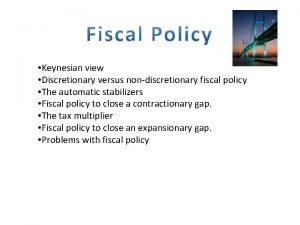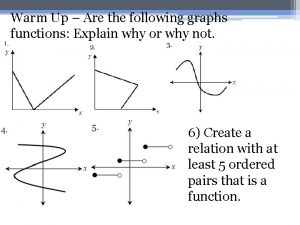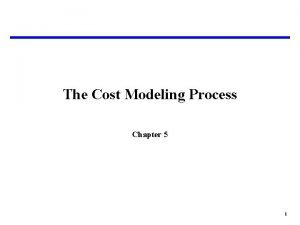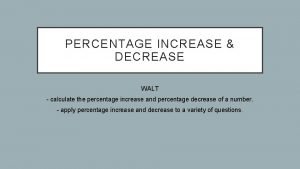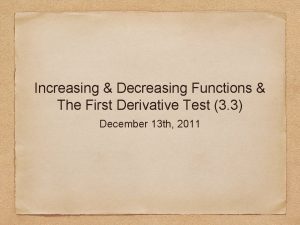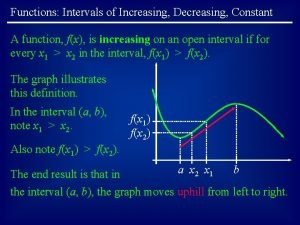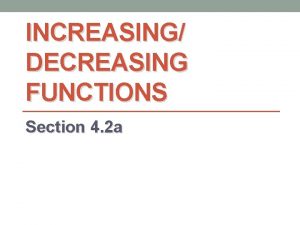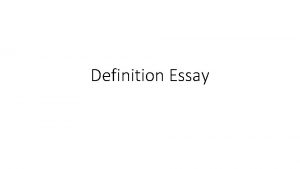6 Decreasing Discretionary Power 1 Definition of discretionary













- Slides: 13

6. Decreasing Discretionary Power 1

Definition of discretionary power Discretionary power is the power to issue a regulatory measure (of general or particular content) based on a comparative evaluation of the public, private and collective interests emerging from the procedure before the regulatory agency. The extension of discretionary power The scope of discretionary power has expanded during the first half of the 20 th century, because of the growth of the public regulation of markets. Licenses, authorizations, economic planning, subventions and incentives, sanctions were the expression of a wide discretion of regulatory agencies. 2

Limits and controls on discretionary power: towards its reduction Over the second half of the 20 th century, however, legislators and courts have gradually established limits and controls on the exercise of discretionary powers, particularly with regard to the public regulation of markets. Legislators issued statutes on administrative and regulatory procedures, which introduced participatory guarantees that obliged regulatory agencies to take into adequate consideration special interests, modeling their discretionary power. 3

Courts adopted a tighter judicial review on regulatory action, based on tests such as “arbitrary and capricious”, error of fact, error of evaluation, reasonableness, proportionality, which gradually allowed stronger controls on discretionary powers. Supranational legal systems have had a substantial influence on restricting regulatory discretion in the interest of transnational free trade (E. U. and W. T. O. are good examples). 4

Examples of the reduction of discretionary power a) Independent regulatory agencies. After their establishment in U. K. and U. S. A. since the end of the 19 th century, independent regulatory agencies have developed mainly over the last forty years worldwide. These administrative agencies are independent from the executive and the government: independent or semi-independent from political guidance. E. U. law has given impulse to, and supported, these agencies (S. E. B. C. ; electronic communications; energy; antitrust; financial supervision). 5

They operate with high technical expertise, out of political guidance and often with quasi-judicial powers. In this case, their activity consists in applying law to facts more than in exercising the choice among interests on which discretionary power is based (antitrust). More generally, they act with technical powers that are not discretionary (financial markets). b) Entry restrictions reduced. Many countries have lessened discretionary power to issue public measures that impact on companies’ access to market. 6

In some cases: concessions, licenses, authorisations were removed. The so-called “general authorisation” scheme eliminates the previous formal act of authorization for entering a market: a mere private notification is sufficient in order for the company to begin its economic activity (electronic communications). Public authority may only exercise ex post controls. If licenses or authorisations are maintained, this must be justified. And these measures are to be based on objective, transparent and non-discriminatory criteria (“objective authorisations” in the banking sector). 7

The reduction of entry restrictions lessens discretionary powers. c. Science and Regulations must have scientific and technical support. Each regulatory agency shall guarantee “scientific integrity” and shall “ensure the objectivity of any scientific and technological information and processes used to support the agency’s regulatory actions” (U. S. President’s Executive Order of 18 Jan. 2011). Examples: food safety, nuclear plants. This reduces discretionary power as well. 8

Causes and effects of the reduction of discretionary power Causes Ø Strong influence of the economic interests subject to regulation. In particular, private property and enterprise vigorously supported the statutes on regulatory procedures based on participation. Ø Ø Influence of supranational legal systems (such as E. U. ) in reducing discretion to strengthen free trade. Importance of technological development 9

Ø Importance of societal interests: consumers, users, savers. These interests were essential as to the establishment of various independent agencies. For instance, the Interstate Commerce Commission (ICC), the very first federal independent agency (1887), was called “the poor man’s court”. Effects Ø Enterprises benefit from the reduction of discretionary power, since they have easier access to market and face a more controlled power of public authority. 10

Ø Consumers, users, and savers benefit from the reduction of discretionary power, since prices tend to decrease and quality tends to increase due to the easier access of enterprises to markets. 11

Conclusions Independent agencies, “scientific” regulation, participatory procedures, strict judicial control on regulatory actions, reduction of entry restrictions, are well established features of today’s regulation of markets. They all entail reduction of discretionary power, from which many actors in the market benefit. Most evident reductions of discretion derive from the lessening of the barriers to market access, through the diminution of ex ante restrictive measures. Obviously an 12

easier access to market must be consistent with effective ex post public controls on economic activities (controls on fairness, transparency, legitimacy). But also these controls tend to be less discretionary than in the past (disclosure obligations instead of prohibitions in the case of financial conflict of interest). 13
 Define non-discretionary fiscal policy
Define non-discretionary fiscal policy Power trianlge
Power trianlge Discretionary benefits definition
Discretionary benefits definition Consumer discretionary buying behavior
Consumer discretionary buying behavior Discretionary access control definition
Discretionary access control definition Fp&m seta funding
Fp&m seta funding Explain pictures
Explain pictures Decreasing metallic character
Decreasing metallic character Increasing at a decreasing rate
Increasing at a decreasing rate How to find increasing and decreasing intervals on a graph
How to find increasing and decreasing intervals on a graph Increasing electron affinity
Increasing electron affinity Percentage decrease of 500 to 240
Percentage decrease of 500 to 240 First derivative increasing decreasing
First derivative increasing decreasing Constant intervals
Constant intervals
